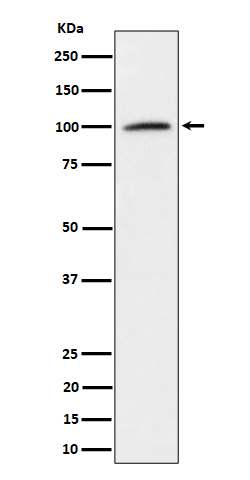
| WB | 咨询技术 | Human,Mouse,Rat |
| IF | 咨询技术 | Human,Mouse,Rat |
| IHC | IHC:1/100-1/200;IHF:1/50-1/200 | Human,Mouse,Rat |
| ICC | 1/50-1/200 | Human,Mouse,Rat |
| FCM | 咨询技术 | Human,Mouse,Rat |
| Elisa | 咨询技术 | Human,Mouse,Rat |
| Aliases | NCL; Nucl; Nucleolin; Protein C23;;NCL |
| WB Predicted band size | Calculated MW: 77 kDa ; Observed MW: 100 kDa |
| Host/Isotype | Rabbit IgG |
| Antibody Type | Primary antibody |
| Storage | Store at 4°C short term. Aliquot and store at -20°C long term. Avoid freeze/thaw cycles. |
| Species Reactivity | Human,Mouse,Rat |
| Immunogen | A synthesized peptide derived from human NCL |
| Formulation | Purified antibody in PBS with 0.05% sodium azide,0.05% BSA and 50% glycerol. |
+ +
以下是关于Nucleolin抗体的3篇代表性文献及其摘要概括:
1. **"Nucleolin as a cell surface receptor for tumor necrosis factor alpha inducing protein"**
*作者:Sugahara, K. et al.*
**摘要**:研究揭示了Nucleolin作为细胞表面受体与肿瘤坏死因子α诱导蛋白(Tipα)的结合机制,发现其抗体可阻断Tipα介导的癌细胞侵袭,为癌症治疗提供潜在靶点。
2. **"Cell surface nucleolin is involved in the cellular entry of respiratory syncytial virus"**
*作者:Tayyari, F. et al.*
**摘要**:该文献证明细胞表面Nucleolin是呼吸道合胞病毒(RSV)入侵宿主细胞的关键受体,使用特异性抗体可显著抑制病毒感染,提示其在抗病毒治疗中的应用价值。
3. **"Antibody targeting of surface nucleolin suppresses tumor growth and metastasis"**
*作者:Huang, Y. et al.*
**摘要**:研究开发了一种靶向Nucleolin的单克隆抗体,通过抑制肿瘤细胞增殖、血管生成和转移,显著延缓多种癌症模型进展,验证了Nucleolin作为治疗靶点的潜力。
如需具体期刊信息或更多文献,可进一步说明需求方向(如诊断/治疗/机制)。
Nucleolin is a multifunctional phosphoprotein predominantly located in the nucleolus, though it also shuttles to the cytoplasm and cell membrane. It plays critical roles in ribosome biogenesis, chromatin organization, RNA metabolism, and regulation of cell proliferation, apoptosis, and stress responses. Structurally, it contains three conserved domains: an N-terminal acidic region with phosphorylation sites, central RNA-binding domains, and a C-terminal RGG motif for RNA interactions. Dysregulation of nucleolin is linked to cancer, viral infections, and autoimmune diseases, with overexpression observed in many tumors, making it a potential therapeutic target.
Nucleolin antibodies are essential tools for studying its expression, localization, and function. These antibodies are produced by immunizing hosts (e.g., mice, rabbits) with nucleolin-derived antigens, such as full-length proteins or specific epitopes. They enable detection via techniques like Western blotting, immunofluorescence, and immunohistochemistry. Specificity varies depending on the antibody clone; some recognize conserved regions across species, while others target post-translational modifications or disease-associated variants. Validation includes knockout controls and cross-reactivity assessments. Applications range from basic research on ribosome assembly to clinical studies exploring nucleolin's role in cancer progression or as a biomarker. Challenges include distinguishing nucleolin isoforms and ensuring consistent performance across experimental conditions.
×